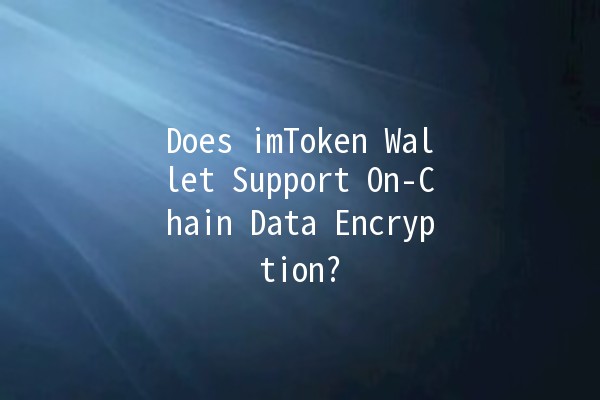In the rapidly evolving world of blockchain and cryptocurrency, the terms "security" and "data encryption" take center stage. With the emergence of various digital wallets, users are often left wondering about their functionalities, especially when it comes to protecting their assets and data. One such wallet is imToken, a popular choice among crypto enthusiasts. This article delves into whether the imToken wallet supports onchain data encryption, providing insights into its features, benefits, and practical tips on enhancing your security while using the platform.
Before we assess imToken's capabilities, let’s clarify what onchain data encryption really means. Onchain encryption refers to the methods used to secure data that are stored directly on a blockchain. This type of encryption allows for the data to remain confidential and tamperresistant while being verifiable by all participants in the network. The most common method involves cryptographic algorithms that encrypt user data before it’s written to the blockchain.
Enhanced Security: Protects sensitive information from unauthorized access.
Transparency: While the data is encrypted, the blockchain allows for verification without disclosing the underlying information.
Immutable Records: Once encrypted data is recorded on the blockchain, it cannot be altered without consensus from the network.

imToken is a decentralized wallet that supports multiple cryptocurrencies, enabling users to manage their digital assets seamlessly. It allows users to interact with different blockchain networks and decentralized applications (DApps). One of its attractive features is its emphasis on security, but how does its encryption mechanism hold up against onchain requirements?
Private Keys Control: Users are solely responsible for their private keys, ensuring that only they have access to their funds.
Seed Phrase Backup: imToken provides a 12word seed phrase that can be used to recover wallets.
Biometric Authentication: To enhance security further, the app allows biometric logins, adding an extra layer of protection.
The short answer is yes, but with nuances to consider. While imToken does provide robust encryption for private keys and user data, the intricacies of onchain data encryption depend on the specific blockchain being utilized. Since imToken supports multiple blockchains, the encryption features could vary accordingly.
When setting up your imToken wallet, you must securely store your 12word recovery phrase. This phrase is your only lifeline to recover your wallet if you lose access. Consider writing it down on paper and storing it in a safe location.
Always create unique and strong passwords for your imToken account. Avoid using obvious passwords that can be easily guessed. Consider using a password manager to generate and store complex passwords.
If your device supports biometric login options such as fingerprint or facial recognition, activate this feature on the imToken app. This minimization of password entry reduces vulnerability to keylogging attacks.
Regularly review the transaction history on your imToken wallet to detect any suspicious activity. If you see unfamiliar transactions, take immediate measures to secure your wallet.
While imToken allows access to various DApps, always perform due diligence before connecting your wallet. Ensure that the DApp is trustworthy and has a good reputation to mitigate the risk of phishing attacks.
imToken operates as a decentralized wallet, meaning users have full control over their private keys. However, users should understand that while the wallet is decentralized, it interacts with various blockchain networks that may use different encryption standards.
Unfortunately, losing your recovery phrase could mean losing access to your funds. It is crucial to keep your recovery phrase secure and accessible only to you. Always back it up in a safe location.
imToken employs a combination of encryption for your private keys and anonymizes user addresses to protect your privacy during transactions. However, be aware that complete anonymity is not guaranteed on the blockchain.
If your device is lost or stolen, immediately access imToken from another secured device and use your recovery phrase to restore your wallet. If you suspect that your wallet has been compromised, transfer your funds to a new wallet.
imToken supports several major cryptocurrencies, including Ethereum and ERC20 tokens. However, not all cryptocurrencies are supported. Always check the list of supported coins in the app.
Yes, using DApps does carry risks. It is essential to verify the credibility and reputation of the DApp before connecting your wallet to avoid falling victim to scams.
The imToken wallet indeed offers a robust approach to security and encryption, particularly in how it manages private keys and user data. While it doesn’t inherently provide onchain data encryption in all contexts, its security protocols are designed to keep your assets safe. By understanding its encryption functionalities and following best practices, users can ensure a safer experience with their digital assets.
Embracing digital wallets like imToken means you’re stepping into a realm of decentralized finance. However, with great power comes great responsibility; therefore, prioritizing your security and privacy is paramount in this dynamic landscape.